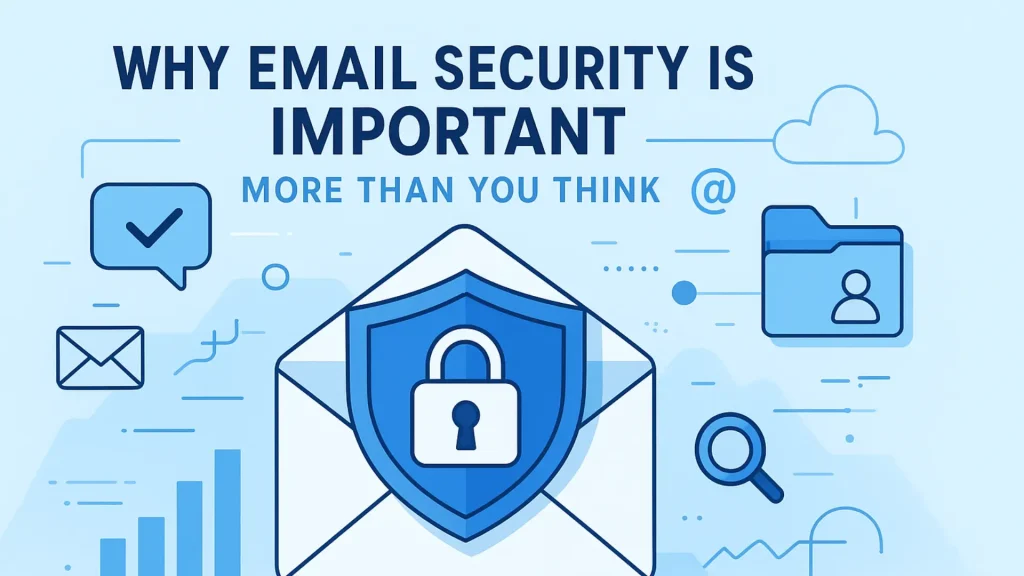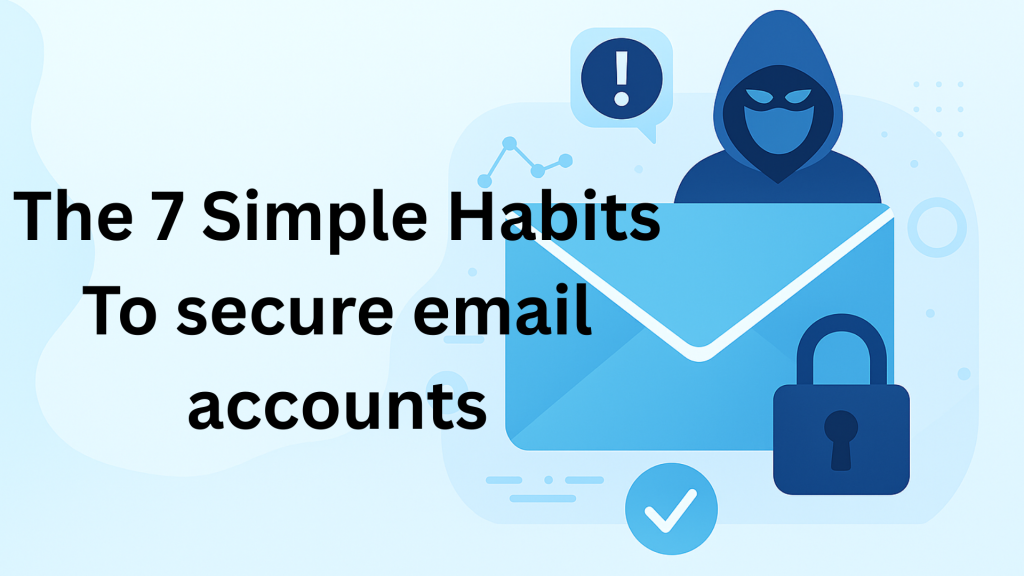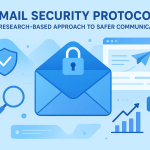Hey there! I’m Jiyasrul, a passionate cyber security learner who’s totally invested in helping people protect their online world. Today, I want to share something close to my heart—how I keep my email safe from hackers every single day. You might think, “Emails are so easy to hack, isn’t it impossible to stay safe?” Well, that’s where you’re so wrong. Over time, I’ve developed 7 simple habits that have helped me stay several steps ahead of those sneaky email hackers. Let me walk you through them in a casual way so that by the end of this, you can keep your email safer too.

Why Email Security Is Important (More Than You Think)
Before diving into my habits, let’s quickly talk about why email security matters. Email isn’t just about chatting with your friends or family; it’s your gateway to everything online. Password resets, bank alerts, private conversations — almost everything goes through email. Once hackers get control, they can steal money, data, or even impersonate you. So protecting your inbox means protecting your entire digital identity.
Habit 1: Using Strong, Unique Passwords Daily (Not Just Set-and-Forget)
If you’re still using your pet’s name or “123456” as your email password, stop right now! Trust me, I’ve seen hackers crack simple passwords in seconds. But here’s the thing: creating a strong password isn’t enough if it’s reused everywhere. What I do is create unique passwords that mix letters, numbers, and symbols for every single account.
You might wonder, how do I remember all these complicated passwords? I use password managers—yeah, those apps that securely store and autofill passwords for you. The cool part is they generate super-strong passwords on their own, so you don’t have to stress about creativity. Try it once; it’s a game-changer.
Habit 2: Activating Two-Factor Authentication (2FA) Everywhere
One password, no matter how strong, can be vulnerable. That’s why I always enable two-factor authentication or 2FA for my emails and other critical accounts. It adds an extra lock—that second step where you enter a code sent to your phone or generated by an authenticator app.
Honestly, it’s like having a secret handshake that hackers don’t know. Some folks skip this thinking it’s a hassle, but I see it as investing seconds for huge peace of mind. The simple act of turning on 2FA has blocked countless hacking attempts against my account.
Habit 3: Watch Out for Phishing Like a Hawk
Phishing attacks are probably the biggest traps hackers use—they send fake emails pretending to be your bank or favorite company to steal your info. When I first started, I almost fell for one myself. But now, I look closely at every email link or attachment before clicking.
I always check the sender’s real email address, look for spelling mistakes, or weird requests like “send your password now.” If I feel suspicious, I don’t just ignore it—I mark it as spam or report to my email provider. This habit teaches you patience, but it saves you from huge headaches.
Habit 4: Regularly Updating My Email Password and Security Settings
It’s easy to set a password once and forget it, but hackers are constantly evolving. That’s why I make it a habit to change my email password every few months and review my security settings regularly. This practice catches any unauthorized access attempts early.
Also, I verify which devices are currently logged in and remove any unfamiliar devices right away. Being proactive this way makes it much harder for hackers to stay hidden if they’ve breached your account elsewhere.
Habit 5: Avoid Using Public or Unsecured Wi-Fi for Email Access
You know how tempting it is to check your email at cafes or airports, right? I’ve been there. But the truth is open Wi-Fi networks can be a hacker’s playground, allowing them to intercept your login details.
Instead, I use my mobile data or a virtual private network (VPN) whenever I can’t avoid public Wi-Fi. A VPN encrypts my internet connection, ensuring that no one else can snoop on what I’m doing. This habit really adds a strong shield around my most sensitive info.
Habit 6: Backup Important Emails and Data Regularly
Losing access to your email is nerve-wracking—not just for messages but all the linked accounts. That’s why I back up my email data every once in a while to a secure location. For example, I export important emails or use cloud backup services I trust.
This habit may seem like extra work, but trust me, when disaster strikes, having backups means you won’t lose everything. It’s all about being prepared ahead of time.
Habit 7: Educate Myself Continuously About New Email Threats
Cybersecurity is not a one-time thing; it’s an ongoing journey. I make sure to stay updated by reading blogs, watching videos, or following trusted experts (like myself, @jiyasrul 😉). There are always new tricks hackers deploy, like sophisticated phishing or hidden malware.
By investing time in learning, I adapt my habits and use the latest tools to stay ahead. It’s like being on a constant adventure to outsmart those who want to harm you.
The Impact of These Habits on My Online Security
These habits may sound simple, but combined they have built a very strong defense around my email. I’ve happily avoided being hacked despite phishing attempts, weird login alerts, and even some malware threats. What’s more, I sleep better knowing that I’m using practical, easy steps that anyone can use.
Summary Table of the 7 Habits
| Habit Number | Habit Description | Key Benefit |
|---|---|---|
| 1 | Strong, unique passwords | Harder to guess or crack |
| 2 | Two-factor authentication (2FA) | Adds extra security layer |
| 3 | Watch out for phishing | Avoids scams and info theft |
| 4 | Regular password updating and device check | Detects unauthorized access early |
| 5 | Avoid public/unsecured Wi-Fi | Prevents network snooping |
| 6 | Regular email backup | Protects data loss |
| 7 | Ongoing education on threats | Stay ahead of hackers’ tactics |
Frequently Asked Questions (FAQ)
Q: What if I forget all my strong passwords?
A: That’s why password managers exist—they store and autofill your complex passwords securely, so you don’t have to memorize them all.
Q: Isn’t 2FA annoying to use every time?
A: It might feel like an extra step, but it drastically improves your security. Most apps also let you mark trusted devices so you don’t have to enter codes every single time.
Q: Can hackers hack 2FA codes?
A: It’s rare but possible. That’s why using authenticator apps instead of SMS codes is safer, and why combining with strong passwords is crucial.
Q: Should I avoid email altogether on public Wi-Fi?
A: If you can’t use a VPN, yes, avoid accessing sensitive accounts on public Wi-Fi. Otherwise, stick to VPNs for safer browsing.


